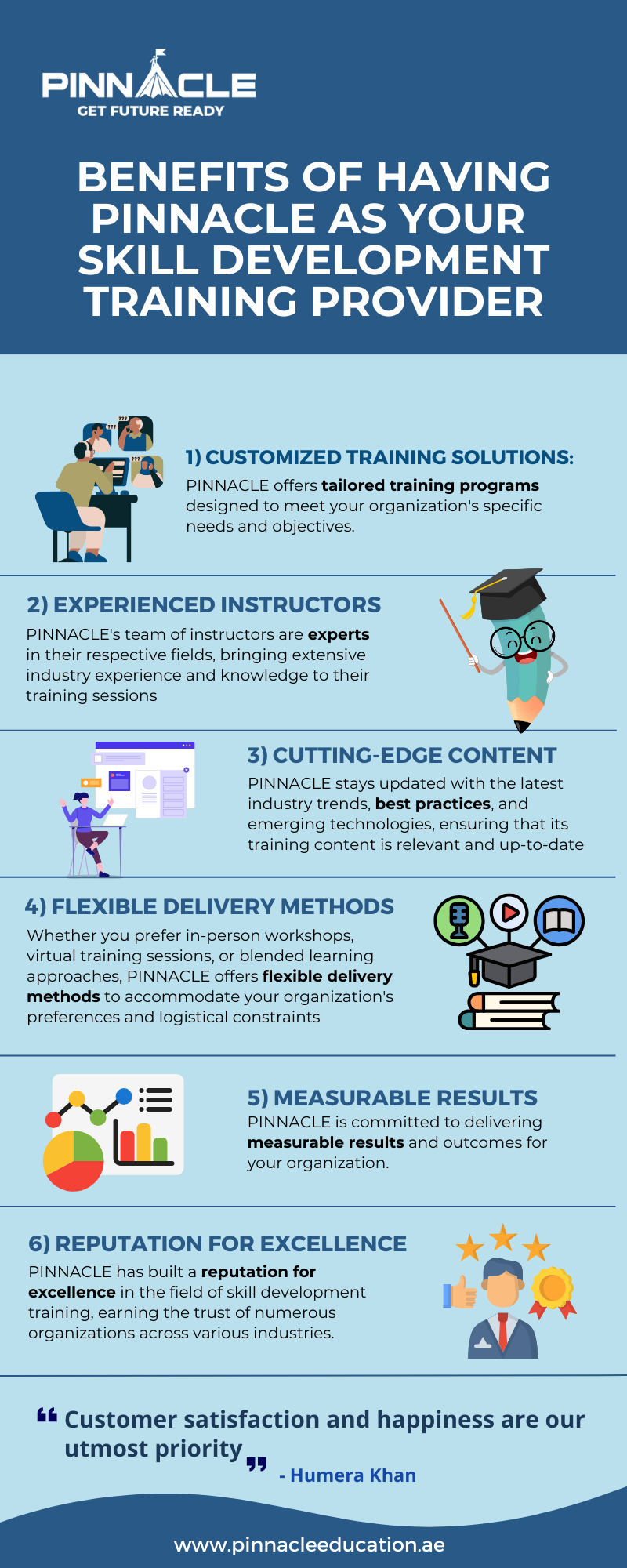What are the effective strategies to acquire new skills, improve performance, and advance our careers or businesses?
1. Identify Skill Gaps: Conduct a self-assessment or seek feedback from mentors, supervisors, or colleagues to identify areas where you need to develop new skills or improve existing ones. Consider the skills required for your current role, as well as those needed for future career advancement or business growth.
2. Set Clear Goals: Define specific, measurable goals for skill development, performance improvement, and career advancement. Establish short-term and long-term objectives that align with your personal or professional aspirations.
3. Invest in Learning and Development: Take advantage of learning opportunities to acquire new skills and knowledge. This could include formal education, online courses, workshops, seminars, conferences, industry certifications, or on-the-job training programs.
4. Seek Feedback and Coaching: Actively seek feedback from supervisors, peers, and mentors to identify areas for improvement and receive guidance on how to enhance your performance. Consider working with a coach or mentor who can provide support, accountability, and personalized advice.
5. Practice Continuous Learning: Cultivate a mindset of continuous learning and self-improvement. Stay informed about industry trends, best practices, and emerging technologies relevant to your field. Dedicate time each week to reading, studying, or engaging in professional development activities.
6. Apply Learning in Real-world Contexts: Apply newly acquired skills and knowledge in real-world situations to reinforce learning and build confidence. Look for opportunities to take on new projects, lead initiatives, or collaborate with others to practice and refine your skills.
7. Network and Build Relationships: Build a strong professional network by connecting with colleagues, industry peers, mentors, and thought leaders. Participate in networking events, join professional associations, and engage in online communities to expand your connections and learn from others.
8. Take on Stretch Assignments: Volunteer for challenging assignments, projects, or roles that allow you to stretch beyond your comfort zone and develop new skills. Proactively seek opportunities to broaden your experience and demonstrate your potential for advancement.
9. Set Aside Time for Reflection and Planning: Regularly reflect on your progress, achievements, and areas for growth. Evaluate your career or business goals, assess your performance, and adjust your strategies as needed to stay on track toward your objectives.
10. Stay Flexible and Adapt: Be open to change and willing to adapt to evolving circumstances, technologies, and market conditions. Embrace new opportunities, pivot when necessary, and be proactive in navigating your career or business journey.
By implementing these strategies and adopting a proactive approach to skill development, performance improvement, and career advancement, you can position yourself for success and achieve your goals in both your professional and personal life.
What are the benefits of having PINNACLE for your Training needs?
Choosing PINNACLE as your Skill Development Training Provider can bring many benefits to you. Some of them are below
Customized Training Solutions: PINNACLE offers tailored training programs designed to meet your organization’s specific needs and objectives. Whether you require technical skills development, leadership training, or industry-specific workshops, PINNACLE can create customized solutions to address your unique requirements.
Experienced Instructors: PINNACLE’s team of instructors are experts in their respective fields, bringing extensive industry experience and knowledge to their training sessions. They provide valuable insights, practical advice, and real-world examples, enhancing the learning experience for participants.
Cutting-Edge Content: PINNACLE stays updated with the latest industry trends, best practices, and emerging technologies, ensuring that its training content is relevant and up-to-date. Participants receive training on the most current tools, methodologies, and techniques, keeping them ahead of the curve in their respective fields.
Flexible Delivery Methods: Whether you prefer in-person workshops, virtual training sessions, or blended learning approaches, PINNACLE offers flexible delivery methods to accommodate your organization’s preferences and logistical constraints. This flexibility ensures that training can be easily integrated into employees’ schedules without disrupting daily operations.
Measurable Results: PINNACLE is committed to delivering measurable results and outcomes for your organization. Through pre-training assessments, progress tracking, and post-training evaluations, they measure the effectiveness of their programs and provide valuable insights into participants’ learning and development.
Reputation for Excellence: PINNACLE has built a reputation for excellence in the field of skill development training, earning the trust of numerous organizations across various industries. By choosing PINNACLE as your training provider, you benefit from its reputation for quality, reliability, and customer satisfaction.
Overall, partnering with PINNACLE as your Skill Development Training Provider can empower your organization to unlock the full potential of your workforce, drive innovation, and achieve sustainable growth and success in today’s competitive business landscape.



